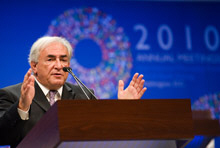
Typical street scene in Santa Ana, El Salvador. (Photo: iStock)
IMF Survey: IMF Call to Work Together for Growth, Jobs, Financial Sector Reform
October 8, 2010
- Working together is “win-win process” in which everyone can be better off
- Countries need to think about new sources of growth
- Multilateral institutions should reflect changes in world economy
IMF Managing Director Dominique Strauss-Kahn called on the 187 members of the IMF and World Bank to work together to restore confidence in an uncertain world.

Strauss-Kahn: “We certainly need to go for growth, to go for jobs, to go for change in the financial sector, but we need to go for cooperation too” (IMF photo)
IMF-WORLD BANK ANNUAL MEETINGS
Addressing the opening session of the 2010 IMF-World Bank Annual Meetings in Washington DC, Strauss-Kahn said countries also need to focus on restoring fiscal sustainability, promoting job-creating growth, and completing reform of the financial sector.
“If you want to restore confidence in an uncertain world, you need to work together. If you want to put people back to work, you need to work together. If you want to build a better and safer world for our children and grandchildren, you need to work together. And this Annual Meetings is certainly the place to do so,” Strauss-Kahn declared.
Amid the much more extensive linkages between the world’s economies, working together is a win-win process in which, with the right policies, everyone can be better off, Strauss-Kahn stated.
At the global level, recovery has arrived, but it is fragile because it is uneven, he noted. Recovery is going well in Asia and South America, and growth is rising in the countries of sub-Saharan Africa faster than in past recoveries. But in Europe and the United States, recovery is sluggish and subdued.
Risks to recovery
Strauss-Kahn said the IMF did not expect a “double-dip” return to world recession. But he specified four downside risks to the recovery.
• Public debt. Countries should aim to return to fiscal sustainability over the medium term, while using available fiscal space to boost growth in the short term.
• Jobless recovery. Growth may not be enough if it is growth without jobs. Countries should promote sustainable growth that creates jobs.
• Change in the financial sector. Financial regulation needs to be supplemented by better supervision and a crisis resolution mechanism. The best rules, if not supervised, will achieve nothing.
• Diminishing commitment to cooperation. The world avoided a crisis as big as the Great Depression by working together, but now the commitment to cooperation needs to be invigorated.
New sources of growth
Strauss-Kahn said the world’s growth model after the global financial crisis will not be the same as the growth model before the crisis. “We need to think about new sources of growth, including green growth. It means that we have to think more about rebalancing the structure of growth between the private part of growth and the public part of growth. It means also that we need to work on rebalancing between surplus countries and deficit countries. And it means that we need enhanced cooperation and governance,” he stated.
Noting that the IMF is in the process of reviewing its governance, Strauss Kahn said that if multilateral institutions are likely to help promote recovery, they need to be legitimate. To be legitimate they need to reflect the changes in the world economy. “This means that the balance of power in the future is going to be slightly different from the balance of power that we experience today.”
A change in the balance of power in a multilateral institution also brings change in responsibility, Strauss-Kahn stated. “Countries that until now were at the border of the international system wanting to come to the center, and wanting this to be reflected in an institution like the IMF, need also to take more responsibility for the stability of the global economy.”
Go for cooperation
“We certainly need to go for growth, to go for jobs, to go for change in the financial sector, but we need to go for cooperation too,” Strauss-Kahn said. “I insist on this because I am afraid that with better growth at the global level, the idea that there is an absolute need in a globalized world to work together may lose some steam.”
World Bank President Robert Zoellick told the Meetings that multiple poles of economic growth, which could drive global demand, were emerging from the world economic crisis. Developing countries are increasingly an engine of global growth, he noted. However, he added that global growth was not strong enough to cut deeply into unemployment.
Opening the session, Annual Meetings Chairman and Nigerian Finance Minister Olusegun Olutoyin Aganga said the global crisis had a severe impact across the globe, exacerbating existing problems and creating new challenges. “The international community must now develop a new global architecture that will reduce the chance of a recurrence, address negative spillovers, protect the vulnerable, and lay the foundations for strong, sustainable, job-rich, and broad-based growth.”


